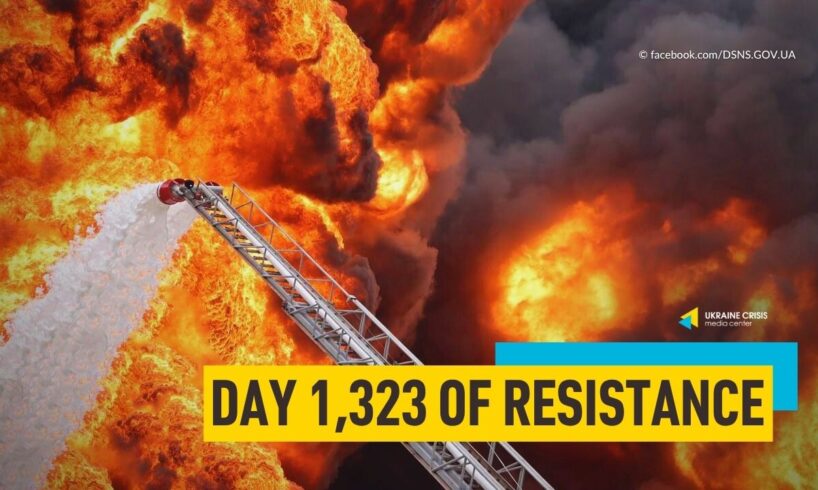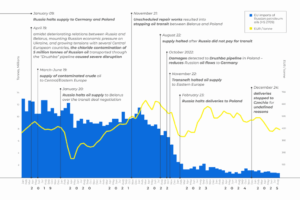
Russia targets individual energy facilities, not the entire grid in a shift of tactics, Ukrenergo says. Airspace violations are part of Russia’s hydrid warfare against Europe, von der Leyen says. EU pressure builds on Belgium to allow the use of Russia’s frozen assets, the Financial Times says.
Russia targets individual energy facilities not entire grid in shift of tactics, Ukrenergo says
Russia has changed the tactics of attacks on Ukraine’s energy grid, targeting select facilities in some regions, head of the board of Ukrenergo national energy operator, Vitaliy Zaychenko said during a meeting with ambassadors of G7 countries, according to the company’s statement released on Tuesday.
“In the past weeks, the enemy has changed the tactics of attacks, shifting away from major airstrikes on all of Ukraine’s energy system and focusing on its elements in separate regions. In such circumstances, the support that [Ukraine’s] international partners are providing to the energy sector becomes even more timely,” Zaychenko said.
Protective facilities are in place at a majority of power distribution substations. They proved their efficiency “dozens of times,” saving the equipment in Russian strikes against the facilities. But the construction of protection still continues, he explained.
“We are grateful to the partners for all the assistance they have already provided. But continued support is now crucial not only to us, but also to all Ukrainian energy companies,” he added.
Zaychenko also said that the energy system is ready for the heating season with the distribution system prepared to transport more power in winter. At the same time, the risks imposed by Russian attacks remain high.
“In order to increase the resilience of our energy system and for us to be able to quickly repair it after the attacks, we need to continue accumulating hard-to-find equipment, which is very difficult to achieve without international support,” Zaychenko said.
Russia struck a thermal power plant of the DTEK company, injuring at least two staff workers, the company said Wednesday.
Russia hit an energy facility in the Nizhyn district of Chernihiv region, leaving more than 4,500 households without electricity, the regional power distribution company said on Wednesday.
Last week, Russia launched the biggest attack of the war on gas production sites of the state-owned gas and oil company Naftogaz, critically damaging some of them. The company said its facilities in Kharkiv and Poltava regions were targeted.
Airspace violations are part of Russia’s hydrid warfare against Europe, von der Leyen says
Systematic Russian incursions into EU airspace are part of a hybrid war that Russia is waging against Europe, President of the European Commission, Ursula von der Leyen said, speaking at a plenary debate of the European Parliament in Strasbourg on Wednesday. The debate aimed to shape a common response to Russia’s violations of EU’s airspace and critical infrastructure.
“Something new and dangerous is happening in our skies. In just the past two weeks, MiG fighters have violated Estonia’s airspace, and drones have flown over critical sites in Belgium, Poland, Romania, Denmark and Germany. Flights have been grounded, jets scrambled, and countermeasures deployed to ensure the safety of our citizens,” von der Leyen said.
She added that airspace incursions are part of a wider pattern of behavior.
“Across our Union, undersea cables have been cut, airports and logistics hubs paralysed by cyberattacks, and elections targeted by malign influence campaigns. These incidents are calculated to linger in the twilight of deniability. This is not random harassment. It is a coherent and escalating campaign to unsettle our citizens, test our resolve, divide our Union, and weaken our support for Ukraine,” von der Leyen said.
“It is time to call it by its name. This is hybrid warfare, and we have to take it very seriously,” she said, adding: “This is a deliberate and targeted grey zone campaign against Europe. And Europe must respond.”
EU pressure builds on Belgium to allow use of Russia’s frozen assets, FT says
Belgium is under growing pressure to allow the use of frozen Russian assets for a “reparations loan” to Ukraine after Berlin and other western capitals shifted their stance, the Financial Times said on Wednesday. The paragraphs below are quoted from the article.
But Belgian Prime Minister Bart De Wever has asked the other 26 EU countries to cover the legal and financial risks associated with this loan, and to guarantee the full amount to avoid Belgium having to pay it back.
His stance has drawn condemnation from other capitals, particularly since Euroclear’s profits have been subject to Belgian corporate tax.
“[Belgium] has spent three years saying Euroclear is Belgian and so are the benefits,” said one senior EU diplomat involved in talks on the matter. “Now, when it wants to share the risks, it claims Euroclear is European.”
Other capitals argue that Ukraine’s predicament requires solidarity, and point out that Poland agreed to host the main supply hub for arms to Ukraine, and Denmark to send F-16 fighter jets to Kyiv without asking for risks to be shared by others.
“There is no more low-hanging fruit,” said another EU diplomat. “Everyone has to do what they can.”
“We think actually that the risks here for Belgium are rather limited,” said a senior EU official. “That is not to say that there is no risk at all and it is not to say that we do not want to engage in a very serious discussion with Belgium . . . But these risks are probably manageable.”
But the Belgian government said that “the current plan that is circulating is not satisfactory”, and that contingent liabilities did not sufficiently “address the issue of risk coverage”.
The commission, backed by the majority of EU capitals, argues that the loan is structured in a way that does not amount to asset confiscation and points out that court rulings outside the bloc are not recognised by the EU.
“What is the alternative?” Denmark’s Prime Minister Mette Frederiksen told the FT when asked about opposition to the frozen assets plan. “We have to find a way with financing, and if it’s not this way then I haven’t heard of any [other] ideas.”





